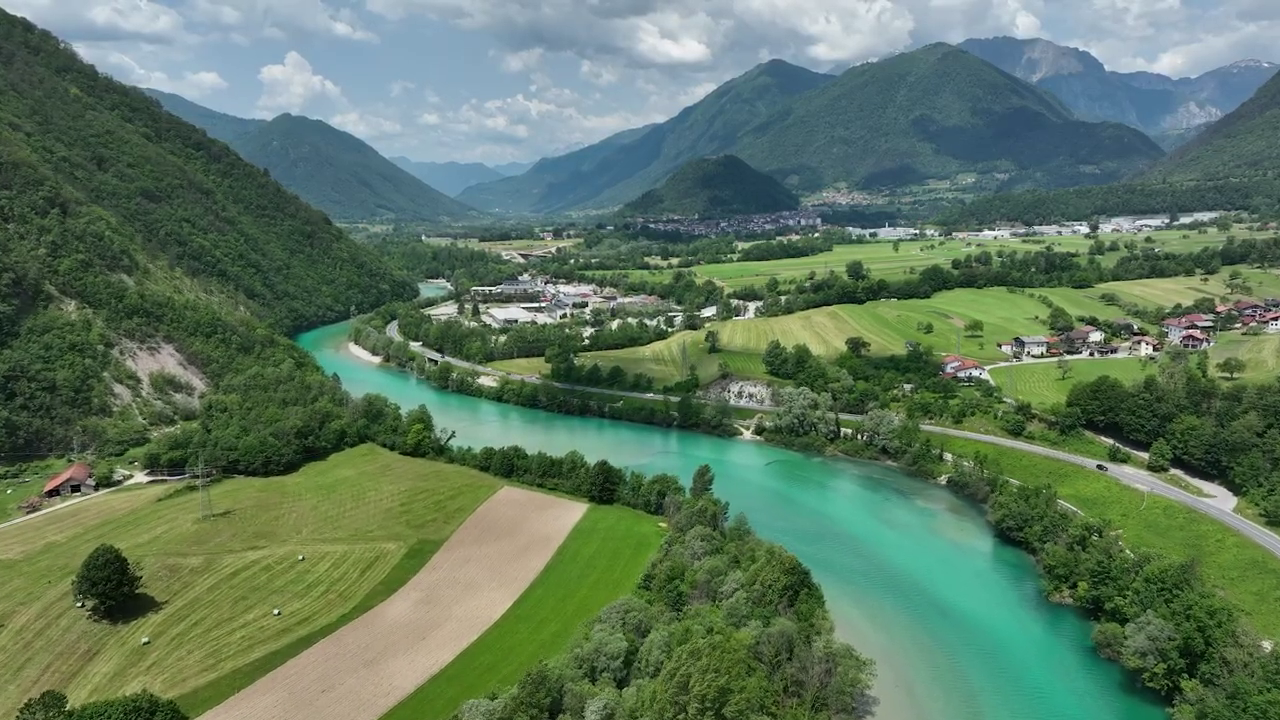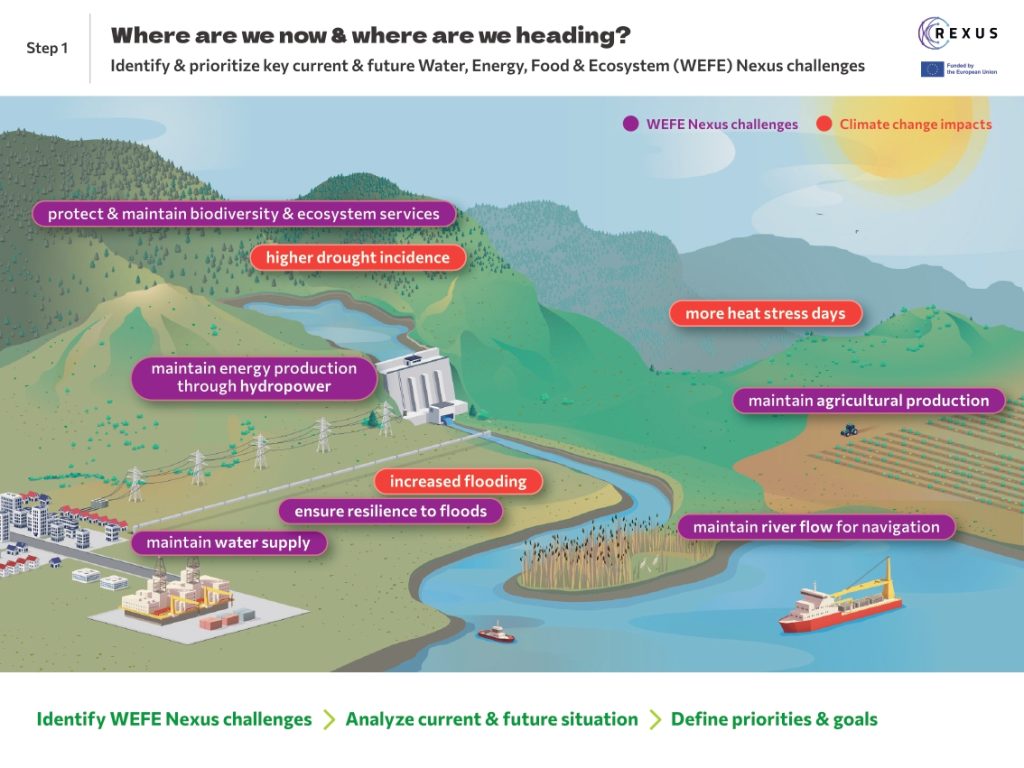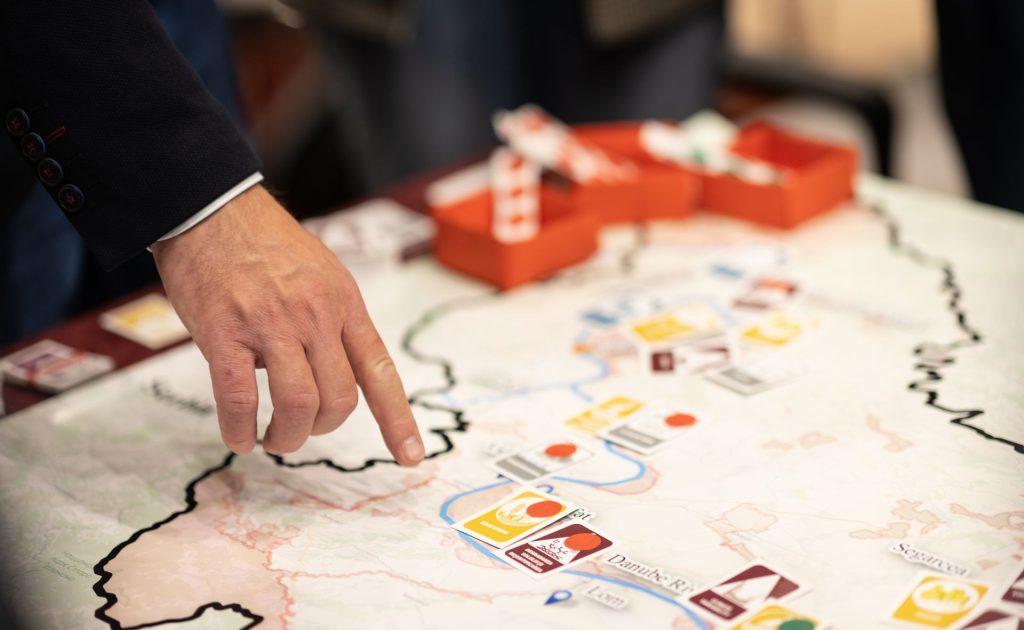News
Nature-based solutions for key resources

News | May 2025
As biodiversity loss, climate change and pollution increasingly impact access to vital resources like clean water, we need to find solutions that address not just one challenge, but many.
Today, the EU-funded REXUS project launched a new guide, edited by UNEP-WCMC experts, which shows why nature should be integrated into strategies for addressing water, energy, food and ecosystems challenges, and how to do so.
The REXUS Framework is aimed at practitioners and technical experts working in natural resources management at any level of governance – from local through to national and international. It provides highly practical, step-by-step guidance to identify key water, energy, food and ecosystem challenges, the links between them, and the potential contribution of different solutions to address these challenges in landscape-scale strategies.

The first step of the REXUS Framework, as outlined in the new guidance, is identifying and prioritizing water, energy, food and ecosystem challenges
The need for joined-up thinking
The Intergovernmental Platform on Biodiversity and Ecosystem Services (IPBES) recently emphasized the need for a holistic, joined-up approach to the planetary crises in its landmark Nexus Assessment. The ‘nexus’ approach focuses on the connections and links between themes or issues. While the Nexus Assessment focuses on biodiversity, water, food, health and climate change, and REXUS focuses on water, energy, food and ecosystems, both these efforts demonstrate the importance and value of connected, systems thinking.
For example, the links between water and food production have long been recognized – water is essential to agriculture, and integrated approaches in these sectors are common. However, wider links with the energy sector and the related impact on ecosystems have been less well explored. Water extraction for agriculture can reduce the flow of water needed for energy infrastructure to run efficiently, and vice versa. Diverting water away from natural areas for agriculture and infrastructure can also degrade important ecosystems like wetlands, make them less habitable for wildlife and reducing their ability to perform vital functions, like enhancing water quality.
Moving from ‘nexus thinking’ to ‘nexus doing’
Looking at challenges through a nexus approach rather than separately helps to identify solutions that work across water, energy, food and ecosystems. However, while the theory for doing so may be clear, shifting from ‘nexus thinking’ to ‘nexus doing’ has been more limited. The REXUS Project brought together sustainability experts from 19 scientific organisations, including UNEP-WCMC, to explore how policymakers and practitioners can make that shift in practice.
Focusing on five pilot areas (four in Europe and one in Latin America), the project firstly examined issues affecting the water, energy and food sectors in these regions, the links between them, and the connections with local ecosystems, under different climate change scenarios. Once these interlinkages were identified in each pilot area, a range of possible solutions was identified and evaluated against specific criteria, including cost, effectiveness, and social and environmental outcomes. The REXUS Framework was developed based on the insights from these pilots and includes a range of potential methodologies that can be used to identify suitable solutions.
Incorporating Nature-based Solutions
An important focus of the REXUS Framework is helping decision makers consider and evaluate Nature-based Solutions (NbS) alongside other approaches when designing strategies. NbS are actions taken to protect, conserve and restore nature which help address social, economic and environmental challenges, thereby providing multiple additional benefits.
An example of an NbS considered in the new guide is wetlands that were constructed in northern Italy to decrease water pollution from surrounding urban areas. Water quality was improved as a result, and there were also secondary benefits: local flood risk was reduced, those living in nearby cities could enjoy new green spaces, and habitat was created for birds, amphibians and other species. As the guide’s authors point out, a more traditional approach using ‘grey’ infrastructure (e.g. the installation of a water treatment plant) may have successfully addressed the pollution, but would not have brought the additional benefits – and it may have been more expensive. Of course, every situation is different and there will always be costs and trade-offs to consider – in some instances, a combination of nature-based and grey solutions will be the best approach.
Involving stakeholders from the outset
A fundamental element of the REXUS Framework is the use of a participatory approach, where stakeholders are engaged in discussions from the very start of developing new strategies. This ensures a wide range of knowledge bases and perspectives are included, brings about greater collaboration and reduces the likelihood of conflict. It also increases support for the actions and outcomes, as those affected have been involved in the process.

Exercises such as participatory mapping allowed for a range of perspectives to be heard during REXUS Project workshops. Photo: GWP-Med.
Throughout the pilots, interactive sessions such as workshops and interviews facilitated dialogue and exchange between stakeholders. They also proved a powerful way of identifying and prioritizing challenges, and finding solutions.
Enhancing resilience in the face of climate change
Keeping nature at the heart of strategies to address water, food and energy issues is important to ensure longer-term sustainability and resilience, particularly when faced with mounting impacts from climate change. This was made clear partway through the project in one of the REXUS pilot areas, the Pinios River basin in Greece. This resource-rich region – which is responsible for one quarter of the country’s agricultural production – was devastated by flooding during Storm Daniel in 2023. A year’s worth of rain fell in the region in just 48 hours, resulting in drastic social, economic and environmental impacts.
This event gave a new level of urgency to the project. It also showed how we cannot afford to leave nature out of the picture when considering water, food and energy strategies.
Our experience with the NbS selection framework has been very positive. It represents a step in translating science into practical action, bringing technical knowledge closer to concrete action and facilitating learning and knowledge transfer in the process. We consider the REXUS NbS selection framework to be a tool that not only facilitates decision-making for selecting NbS in the Júcar Basin [in Spain] and similar regions, but also allows us to teach and acquire knowledge about NbS.
Esteban Henao, AgriSat
Download NbS in the WEFE Nexus: A framework for integrating Nature-based Solutions into strategies to address interconnected Food, Water, Energy and Ecosystem challenges here. Thanks to partners from Deltares, Universita Degli Studi Di Padova, Etifor and the whole REXUS consortium.
For more information on the REXUS Project, click here.
Main image: The Nima River watershed in Colombia, one of the five pilot areas studied in the REXUS project. Photo: GWP-Med.
Have a query?
Contact us
communications@unep-wcmc.org
